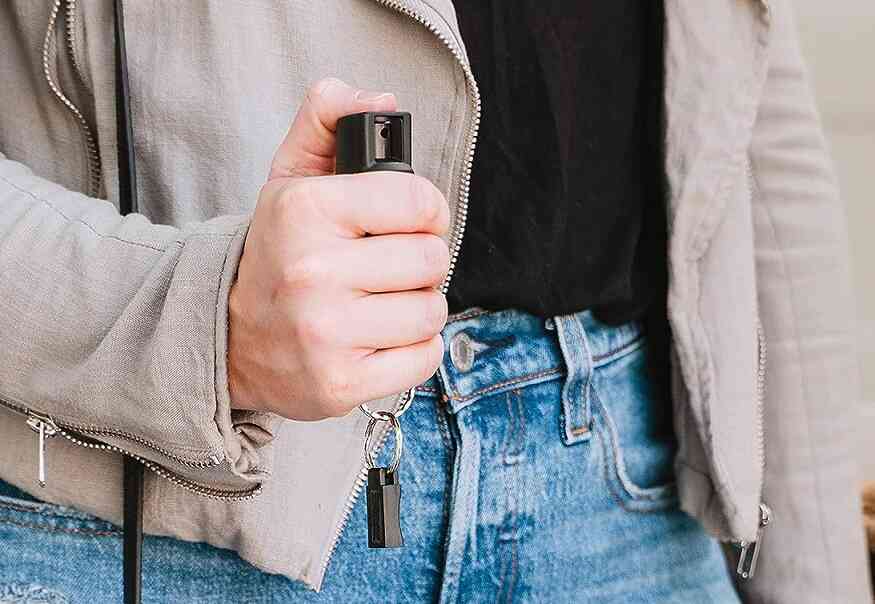The Science Behind Pepper Spray: How Does It Work?
What Is Pepper Spray?
Pepper spray, also known as OC spray (oleoresin capsicum), is a non-lethal aerosol spray containing an active ingredient derived from hot chili peppers. It’s widely used by law enforcement, individuals, and security personnel as a tool to deter potential threats without causing permanent harm.

The Active Ingredient: Capsaicin
The secret behind pepper spray’s potency lies in capsaicin, the naturally occurring compound responsible for the fiery sensation in chili peppers. When used in pepper spray, capsaicin affects the mucous membranes, skin, and respiratory system of an attacker, causing intense discomfort and temporary incapacitation.
The Effects on the Human Body
When pepper spray comes into contact with an individual, it triggers an immediate response. The eyes start to tear up profusely, the nose runs, and coughing ensues. The capillaries in the eyes and skin dilate, causing a burning sensation and temporary blindness. These effects are short-lived and wear off as the spray dissipates.
How Pepper Spray Works
Pepper spray works by disrupting the functions of the eyes, nose, and respiratory system. When sprayed, the capsaicin binds to pain receptors, triggering a response from the nervous system. This results in an intense burning sensation and involuntary closing of the eyes. The respiratory system’s reaction causes coughing and difficulty breathing.
Dispersion Mechanisms
Pepper spray can be dispersed in various ways, including streams, cones, and gels. The choice of dispersion mechanism depends on the user’s preference and the intended use. Streams provide accuracy, while cones cover a wider area. Gels are less affected by wind and are less likely to blow back on the user.
Proper Usage and Safety Tips
Using pepper spray requires responsible handling. Aim for the attacker’s face, maintaining a safe distance. After deploying the spray, quickly move away to avoid backlash. Practice using inert training sprays to familiarize yourself with the device. Check the expiry date regularly and replace the canister if it’s past its prime.

Comparing Pepper Spray to Other Self-Defense Options
Pepper spray offers several advantages over other self-defense methods. Unlike firearms, it doesn’t carry the risk of permanent injury or death. It provides a tactical advantage, allowing individuals to disable attackers from a distance. Moreover, its accessibility and ease of use make it a practical choice for a wide range of people.
Legal Considerations
While pepper spray is legal in many places, it’s essential to understand local regulations. Some jurisdictions have restrictions on the concentration of capsaicin or require a permit for use. Research your local laws and regulations before purchasing and using pepper spray.
Myth Debunking: Common Misconceptions
There are several misconceptions about pepper spray. One common myth is that it’s effective on everyone. While most individuals will be affected by pepper spray, some may have a higher tolerance due to factors like alcohol or drug use. Additionally, wind and weather conditions can affect its effectiveness.
Pepper Spray Variants: Foam, Gel, and Fog
Pepper spray comes in various formulations, each with its own advantages. Foam sticks to the target upon impact, minimizing the risk of blowback. Gel has a longer range and is less likely to disperse in windy conditions. Fog provides wide coverage but can be affected by the wind.
The Importance of Training
Proper training is crucial for effective pepper spray usage. Training programs teach users how to handle the spray, aim accurately, and react to different situations. Training also provides the confidence needed to use the spray effectively in high-stress situations.
Using Pepper Spray Responsibly
Pepper spray should only be used in self-defense situations. It’s not meant for aggression or as a toy. Using it improperly or irresponsibly can result in legal consequences and harm to innocent parties.
Storing and Checking Expiry Dates
Pepper spray has a limited shelf life. It’s important to store it in a cool, dry place and check the expiry date regularly. An expired canister may not perform as intended, potentially putting you at risk.
Conclusion
Pepper spray’s effectiveness lies in its ability to temporarily incapacitate attackers, providing a window of opportunity for escape. Understanding the science behind its functioning empowers users to make informed decisions about their safety.
FAQs
Is pepper spray legal everywhere?
Pepper spray’s legality varies by jurisdiction. Research your local laws before purchasing and using it.
Can I carry pepper spray on an airplane?
Most airlines prohibit carrying pepper spray in your carry-on luggage. Check with the airline and TSA guidelines for specific rules.
Does pepper spray work on animals?
Pepper spray can be effective on animals, but specialized animal deterrent sprays are recommended for this purpose.
How do I decontaminate after using pepper spray?
To decontaminate, flush your eyes with cold water and use a mild soap on your skin. Avoid touching your face during this process.
Can I practice using pepper spray?
Yes, inert training sprays are available for practice. Familiarize yourself with the spray’s operation and aim using these training tools.
Disclaimer
Certain content that appears on this site comes from Amazon. As an Amazon Associate we earn from qualifying purchases. Read full Disclaimer Here!






